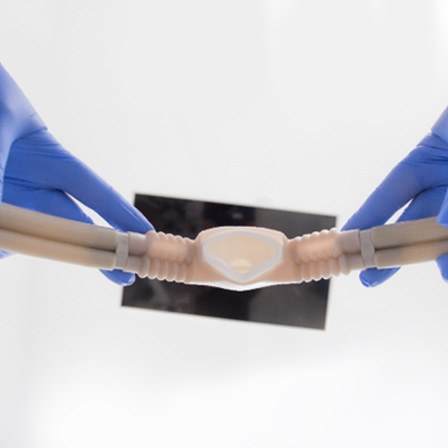Sedation Dentist – Oklahoma City, OK
Alleviating Anxieties for Better Dental Experiences

People fear many things…flying, spiders, small spaces, heights, and the number 13. These phobias may not be explainable, but they are very real and very intimidating. If you fear dental visits, the dentist, or dental pain, please tell us. We respect your fear! If you have postponed dental care because you feel mildly stressed or anxious, let us know. Dr. Holman can relieve your mind with sedation dentistry in Oklahoma City.
Why Choose Dental Expressions for Sedation Dentistry?
- Comfortable, Non-Clinical Dental Environment
- Compassionate & Caring Dental Team
- Two Safe and Effective Sedation Solutions
Nitrous Oxide Sedation

Known as the mildest form of sedation dentistry available, nitrous oxide is administered by placing a mask over your nose and through the inhalation process. With effects that take only minutes to develop, you will begin to feel fully relaxed, at ease, and almost euphoric. You might even feel slightly warm. Although nitrous oxide does work to prevent pain and create a more calming experience, you will remain cognizant throughout treatment, capable of responding to cues from our dental team. Once treatment is complete, we will remove the mask and turn off the gas, allowing you to resume normal activity immediately after your appointment.
Oral Conscious Sedation

Oral conscious sedation is a small sedative in pill form. The dentist can prescribe the medication for you to take before your visit. Plan to be driven to and from the appointment by a friend because you’ll feel groggy. Once you have arrived, your level of sedation can be adjusted so that you feel completely comfortable. No treatment will begin until you feel relaxed and ready to begin. Under oral sedation, you will respond to commands and instructions, but you'll feel more relaxed and comfortable. You will then be able to leave and enjoy your restored and improved smile!
Reasons for Sedation Dentistry

- Fear of control issues
- Stress or anxiety
- Poor response to local anesthesia
- Physical discomfort in the dental chair
- Lengthy or multiple procedures
- Severe gagging
Sedation Dentistry FAQs

Even people who struggle with dental anxiety often find it easier to walk through the front doors of our dental practice once they discover the benefits of sedation dentistry. Are you thinking about getting nitrous oxide or oral conscious sedation at your next appointment? If so, step one is to talk to our dental team to learn more about these services and ask any questions that are on your mind. Here are a few things that many of our patients have often wondered about regarding sedation.
Does Dental Sedation Make You Tell Secrets?
Many people believe that being under the effects of dental sedation will cause them to say things that they normally wouldn’t. However, this typically isn’t the case; there is very little chance of you giving away any secrets under the influence of nitrous oxide or oral conscious sedation. And in the unlikely event that you do end up saying more than you intend, you can rest assured that it won’t leave our treatment area.
Does Dental Sedation Put You to Sleep?
You may expect sedation dentistry to involve putting you to sleep – especially if you have ever heard it referred to as “sleep dentistry.” In truth, it is only meant to help you relax; you will still be conscious while in the dental chair. Sometimes it may feel like you fell asleep, but more often than not this is due to sedation making it difficult to remember what happened during your treatment.
That being said, one side effect of oral conscious sedation is drowsiness. As such, there’s a chance that you might doze off on your own accord. Usually, though, a gentle nudge will be all it takes to wake you up again.
Is Sedation Dentistry Safe While Pregnant?
It’s not recommended to have dental sedation performed during the first and third trimesters of pregnancy. During the first trimester, there’s a chance of the drugs affecting the development of the fetus. And if it’s used during the third trimester, it could possibly lead to premature labor.
The second trimester is usually the safest time for sedation dentistry, although it’s still recommended that you go with the most minimal option available, which generally means nitrous oxide. Additionally, if you need an invasive procedure that might warrant sedation, it’s often better to put it off until after you’ve given birth.
Is Sedation Dentistry Covered by Insurance?
The answer to this question varies from plan to plan as well as patient to patient. Most insurance companies typically don’t cover the cost of dental insurance since it isn’t considered medically necessary. However, coverage might be available in specific circumstances, such as:
- Being unable to have dental work done without sedation due to cerebral palsy or another type of disability.
- Having a complex procedure performed. (A common example is when there are multiple teeth that need to be removed for the sake of your oral health.)
It never hurts to speak with your insurance company to double-check your benefits, so give them a call to see how they handle sedation dentistry.




